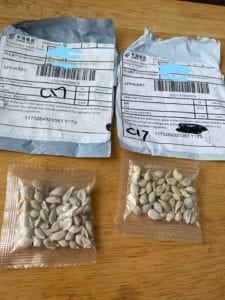TRENTON, NJ – New Jersey, although it got its butt kicked big time this spring with the COVID-19 “China Virus” is now fighting a new battle, “China Seeds”. Officials in New Jersey warned residents today about seed packages coming from China.
“The New Jersey Department of Agriculture has received reports of individuals receiving unsolicited seeds through the mail from China. Unsolicited seeds could be invasive, introduce diseases to local plants, or be harmful to livestock. Sometimes the seeds are sent in packages stating that the contents are jewelry,” the state said today.
Here’s what to do if you receive unsolicited seeds from another country:
- DO NOT plant the seeds and if they are in sealed packaging do not open the sealed package.
- Take a photo of the package and seeds and send the photos to USDA Smuggling Interdiction and Trade Compliance at Mail@aphis.usda.gov.
- Maintain the seeds and packaging and send to the USDA Office located at:
USDA APHIS PPQ
Attention: Gregory Soto
1500 Lower Road
Linden, NJ 07036
Please write down your name, address, phone number and email address on a piece of paper and insert it in your package. If you have already planted or discarded seeds please send an email to Gregory.t.soto@usda.gov.
If individuals are aware of the potential smuggling of prohibited exotic fruits, vegetables, or meat products into or through the USA, they can help APHIS by contacting the confidential Anti-Smuggling Hotline number at 800-877-3835 or by sending an Email to SITC.Mail@aphis.usda.gov. USDA will make every attempt to protect the confidentiality of any information sources during an investigation within the extent of the law.

